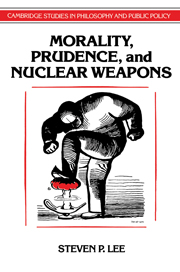3 - The logic of deterrence
Published online by Cambridge University Press: 06 July 2010
Summary
Is practicing nuclear deterrence prudentially preferable to not practicing it? Does prudence in the end counsel maintaining or abandoning nuclear deterrence? This is the central question in any examination of the fundamentals of nuclear weapons policy. The conclusion in Chapter 1 was that nuclear deterrence is, in prudential terms, justifiable, hence preferable, but there the discussion was restricted to the traditional approach to the evaluation of military policy. A broader prudential perspective must now be considered, as a broader moral perspective was considered in Chapter 2. The results of considering nuclear deterrence from a broader prudential perspective will have important implications for the moral appraisal of the policy, because of the confluence between the prudential and the consequentialist assessments. The consequentialist argument in Chapter 2 is based on the prudential argument in Chapter 1, so that if nuclear deterrence is shown, from the broader prudential perspective, to be preferable, then one may assume that the consequentialist argument from Chapter 2 stands and that the moral conflict remains unresolved. But if nuclear deterrence is shown not to be prudentially preferable, the implication is that the consequentialist argument from Chapter 2 is unsound and that the consequentialist assessment is not opposed to the deontological assessment. Each would prescribe or allow the abandonment of nuclear deterrence. The pursuit of national security would then be plagued neither by the sharp conflict between prudence and morality nor by the conflict represented by the moral dilemma. In this chapter, a theory of deterrence effectiveness will be developed that will help to answer (in the next chapter) the question whether or not nuclear deterrence is prudentially preferable.
- Type
- Chapter
- Information
- Morality, Prudence, and Nuclear Weapons , pp. 82 - 109Publisher: Cambridge University PressPrint publication year: 1993



